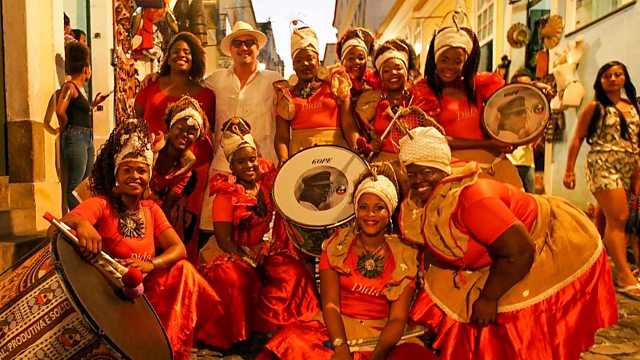
Brazil
Huey Morgan visits Brazil and meets musicians across the country, revealing an astonishingly diverse and political music scene.
91热爆 Radio 6 Music DJ Huey Morgan begins his Latin music adventure in Rio de Janeiro with a visit to Mangueira Samba School as they prepare for carnival. It is an important time. Joining rehearsals, Huey learns that the country鈥檚 government has come out against carnival鈥檚 hedonistic atmosphere. This samba group are just one of many planning a protest, and Huey realises that the revolutionary spirit isn鈥檛 just in Brazilian music, it is out on the streets.
Huey then hits the beach but discovers that Brazilian music in the 1960s wasn鈥檛 confined to the slick bossa nova swing of the Girl from Ipanema. Released in 1964, this song provided the soundtrack for cocktail parties around the world, but in Brazil that same year a military dictatorship had taken control of the country and civil unrest was brewing.
Huey meets up with Gilberto Gil, who pioneered a new, politically conscious sound to push back against the authoritarian government. Fusing bossa nova with psychedelic rock, avant-garde musique concrete, samba, funk and soul, 罢谤辞辫颈肠谩濒颈补 was so radical, and its social implications so politically profound, that Gil and fellow musician Caetano Veloso were arrested, imprisoned and finally exiled in 1969. 罢谤辞辫颈肠谩濒颈补 burned brightly for only a few short years, but its impact still resonates today.
Landing in Salvador, Huey is straight into the heat and the chaos of Brazil in the run-up to carnival. Everywhere you turn there are Afro blocs rehearsing, enormous drum ensembles beating out samba rhythms. Salvador is the ancient capital of Brazil, and it was here that millions of slaves were shipped to from Africa by the Portuguese conquistadors - more than anywhere else in the Americas. Salvador is said to be the largest African city outside of Africa, and the revolutionary sound of Brazil has its foundations here. These Afro blocs are more than just music ensembles - they also play a crucial political role in the communities that host them. Huey meets with Carlinhos Brown, percussionist and Salvador native, to experience the rhythms of an Afro bloc up close and to talk about how Afro-positive music has shaped the sound of Brazil. Huey also joins BaianaSystem to learn the secrets of the Bahian guitar - a revolutionary electric instrument invented in Salvador in the 1940s and performed on floats called trios electricos that traverse the city during carnival.
Leaving Salvador, Huey heads to S茫o Paulo, the centre of the Brazilian music scene today, to meet up with his good friend Supla. Taking a tour of the punk and metal scene, Huey discovers that Brazil is still using music to protest against the authoritarian government currently in power and heads to the studio to meet Karol Conka, a rapper and outspoken feminist who is making party anthems with a purpose.
Last on
More episodes
Previous
You are at the first episode
Next
Music Played
-
![]()
Joe Cuba
Bang Bang
-
![]()
Baden Powell
Canto De Ossanha
-
![]()
Cartola
Alvorada
-
![]()
Adoniran Barbosa
Samba Do Arnesto
-
![]()
Cidinho & Doca
Rap Da Felicidade
-
![]()
Cartola
Verde Que Te Quero Rosa
-
![]()
S茅rgio Mendes & Brasil '66
Mas Que Nada
-
![]()
Jo茫o Gilberto
O Pato (The Duck)
-
![]()
S茅rgio Mendes
Mas Que Nada (feat. Black Eyed Peas)
-
![]()
Joyce
Joya
-
![]()
Ant么nio Carlos Jobim
Agua de Beber
-
![]()
Vinicius de Moraes
Garota De Ipanema
-
![]()
Joyce
Me Disseram
-
![]()
Frank Sinatra, Antonio Carlos Jobim
The Girl From Ipanema
-
![]()
Gil and Capinam
Miserere Nobis
-
![]()
Caetano Veloso
罢谤辞辫颈肠谩濒颈补
-
![]()
Os Mutantes
Ando Meio Desligado
-
![]()
Os Mutantes
Magica
-
![]()
Os Mutantes
Baby
-
![]()
Os Mutantes
Bat Macumba
-
![]()
Os Mutantes
Adeus Maria Fulo
-
![]()
Os Mutantes
A Minha Menina
-
![]()
Carlinhos Brown
Garoa
-
![]()
S茅rgio Mendes
Magalenha
-
![]()
Karol Conk谩
Mundo Loco
Credits
| Role | Contributor |
|---|---|
| Presenter | Huey Morgan |
| Series Producer | Clare Tavernor |
| Executive Producer | Sam Anthony |
| Executive Producer | Lisa Fairbank |
| Executive Producer | Julie Heathcote |
| Editor | Lawrence Huck |
| Production Company | Factory Films |

